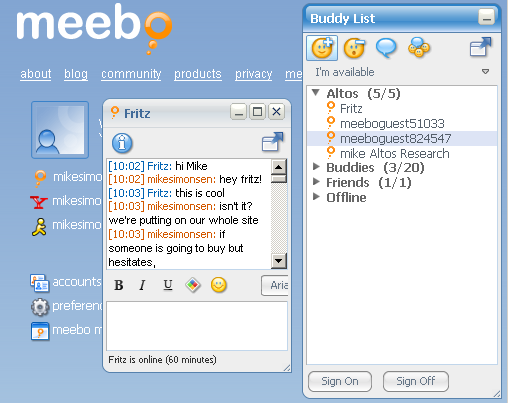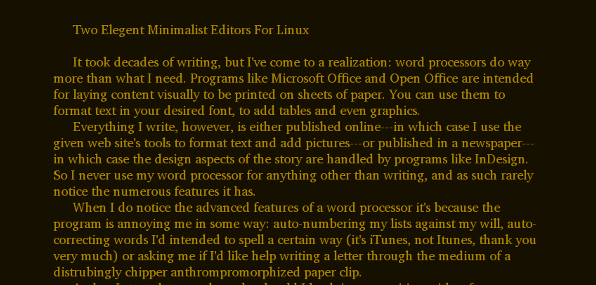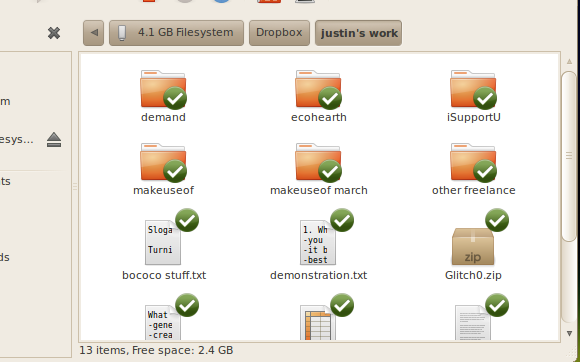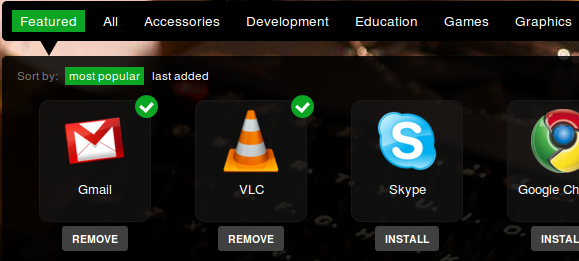If you thought cheap gigabyte hard drives meant no one is concerned about space on their computers anymore, think again. There are plenty of netbook owners out there who, because they opted for a solid state drive instead of a conventional one, have as little as 16, 8 or even 4 gigs of hard drive space. Count me among them: my EEE PC came with only 4 gigs of internal space.
This isn't a problem, though. Unlike with a desktop or a laptop, I have no expectation of being able to carry all my documents, music and videos with me on my netbook. The netbook is, first and foremost, for accessing the net (as its name cleverly implies.)
If you think running a modern computer with only 4 gigs of space is impossible, I've got news for you: I do it all the time. I use my netbook.
How do I manage this with such a small hard drive? Easily. Here are a few tricks I've picked up to free up Netbook disk space.
Use Web Apps
These days everything's on the cloud, and if you can find a desktop app to do something you can probably find a web app for it. I've been using Gmail for my email since it came out in 2004, but I don't stop there. Google Calendar is my calendar, Working Point keeps track of my invoices for work and Meebo is my go-to instant messenger.
These are just a few examples, of course. There are thousands of web apps out there that can help free up Netbook disk space, and if you're looking for one the MakeUseOf Directory is a great place to start.
Want your web apps to feel more like desktop apps? Prism, from Mozilla, can do this for you easily - check out Travis's article about running web apps on your desktop with Prism. If you're more of a Chrome person than a Mozilla person, don't worry: Chrome's got you covered by default. Just click the page icon, then click "Create Application Shortcuts" and you've got it.
Avoid Large Programs
Software can fill your hard drive up quicker than you might imagine, which is why it's generally a good idea to avoid programs larger than is strictly necessary. For example, I never carry a word processer or a spreadsheet program with me on my netbook.
Such programs, be they the Microsoft or Open Office versions, offer more functionality than are needed on a netbook - which I only use for quickly writing on the go - and take up a ton of space in order to offer this functionality. I use a simple text editor in order to write on my netbook, and open .doc and .xls files with Google Docs when absolutely necessary.
If your netbook is running out of space, take a look at the programs you have on it. Are all of them really necessary? Could you do without them? If the answer is yes, uninstall them.
Don't Be a Pack Rat
The era of the cheap gigabyte drive means many of us never put any thought into whether or not to keep data around. As such, deleting files is becominng increasingly rare.
You can't operate this way on your netbook. Installation files, music and documents you aren't currently working on are worth saving, but your netbook is not the place to save them. Keep them on your desktop computer, if you have one, or else invest in an external hard drive. Your netbook should only have files on it that you're currently working on.
Use Dropbox Magic
The easiest way to do this? Some Dropbox magic, of course.
Here's what I suggest you do: use your Dropbox as your "currently working on" folder. Thanks to Dropbox's key feature - namely syncing files across all your computers - all of your current projects will always be on both our machines.
Once you're done with something, you can hop onto your desktop and remove the completed project to a folder outside your desktop, automatically deleting it from your netbook. You'll never lose any data, and never have anything more on your netbook than you absolutely need.
I use this same strategy for all my work, including the stuff I write here at MakeUseOf. I love having the mobility of a netbook combined with the power of a desktop, and being able to seamlessly jump from one to the other as I'm working on something.
For more killer uses of this ultimate syncing software, check out my article on unique ways to use Dropbox.
Switch To A Netbook-Centric OS
Most desktop operating systems - including Windows, Ubuntu and OSX - contain features you'll never realistically need on your netbook. You can try manually stripping them out of your OS, but why bother when there's an exceptional netbook operating system available for free? It's called Jolicloud, and it is built from the ground up for netbooks.
For more information, read my article about Jolicloud being the perfect netbook operating system.
Still Not Enough? Get An SD Card
Almost every netbook on the market has an SD card slot, and SD cards are getting cheaper all the time. If after all these tricks you still need space you can always pick up an SD card. If you can't free up enough Netbook disk space, this is great way to supplement your storage space without the expense of buying a bigger hard drive and installing it.
Conclusion
I love my netbook, but it's really easy to fill up its hard drive. By combining all the strategies I've discussed here, however, I've got to a point where I hardly even notice I've only got 4 gigs of space.
Do you have any space-saving strategies you use to free up space on your netbook? Are you upset I didn't mention every file-syncing program on the planet? Or do you just think netbooks are pretty? I can't say promising will bring you good luck and happiness, but it can't hurt.





